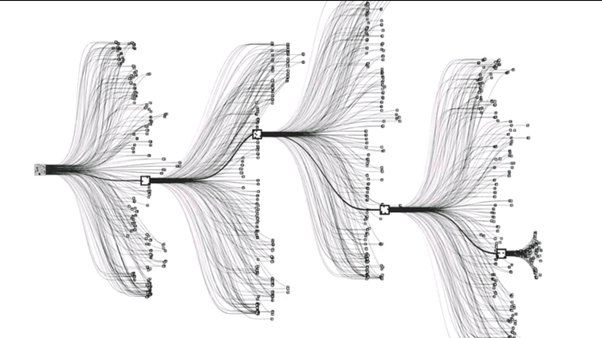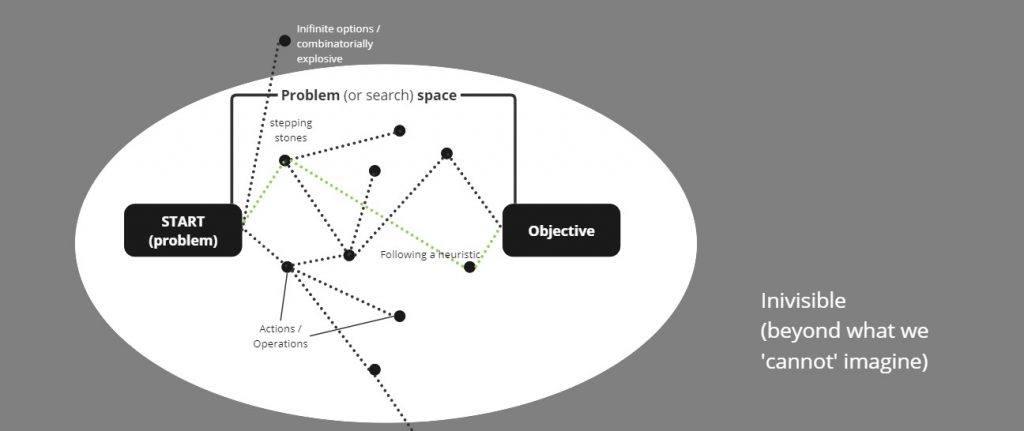Let’s start with a riddle
You’re lost in a labyrinth and you need to get out quickly. It’s a matter of survival.
You chance upon two robots in this labyrinth.
One robot has the algorithm: “I find novel spaces.”
The other robot has the algorithm: “I seek the exit.”
Which robot gives you the best chance of getting out of the labyrinth?
We’ll come back to the answer later.
What’s coming up?
- Why we tend to use objectives
- How the brain problem solves towards an objective
- Why objectives can hinder us from ‘greatness’
- How we can search for greatness in a kind of clever non-objective ignorance
- And why that’s relevant for us in strategy, business and life.
Objectives in their context, why we use objectives and tend to rely on them
In the face of unlimited possibilities, objectives provide a constraint.
Unlimited possibility is like a white noise and by adding constraints, like an instrument does to white noise, we move potentiality into a defined actuality. In our pursuits, we’re the instrument.
Imagine a probability tree diagram with each branch leading onto hundreds of subbranches, and each of those leading onto hundreds more. When defining an objective, we’re choosing one future eventuality through the endless possibilities and aiming to make it a reality.

In other words: objectives make a particular outcome more likely to happen by constraining the divergent possibilities (or eliminating them).
Objectives are reassuring for humans – defining them often makes us feel that we are working towards something, or gives us a sense of ‘certainty’ – and for this reason, they are often linked to business outcomes within commercial organisations.
There’s also a good feeling (dopaminurgic) to be working towards a goal since it reduces the entropy.
So what are we doing when we are pulling ourselves towards an objective?
Even when we use an objective we are making a series of decisions towards it. Even within basic problems (making a cup of tea) there are many potential paths towards the resolution. Far more than we actually realise! More than our brain can actually comprehend, so our brain typically only considers a small number of options, eliminates the rest, and follows familiar paths.
It goes without saying that many of those other options are nonsensical, implausible or hinder one’s own survival (like burning down your house to boil some water), but they are still ‘options’ and its no wonder we eliminate them.
Nonetheless …
How do we figure out what to do? Looking at the neuroscience
There’s a few key concepts we need to explore, so that we have a shared understanding and terminology.

Search space
Between a problem and a solution is a ‘search space’ – the realm of possibilities – a smaller and slightly clearer part of the white noise.
This is the space one searches to find relevant information towards solving the problem.
Stepping stones
Decision-making is like traversing stepping stones across a river
Each decision opens up further possibilities.
Sometimes, we can see the path ahead and we can plan which path to take towards the objective (i.e. get to the other side of the river by jumping from one stepping stone to the other).
But it’s actually a lot more complex than that! Why?
Combinatorial explosion
In reality, we cannot comprehend or calculate all the possibilities or all the possible paths. To calculate all possibilities would be overwhelming for the brain. Billions of stepping stones on a shoreless lake.
In cognitive neuroscience this is called Combinatorial Explosion.
For example, there are more possible moves in a chess game than atoms in the universe. Bearing in mind that there are about thirty potential moves per turn, and typically sixty turns in total, when making a move, you cannot think through all possible implications of each move. You cannot feasibly think through all the repercussions of every move (and every move’s repercussions).
Thus to make decisions without being overwhelmed, the human brain basically relies on heuristics, even towards an objective. So you could say that the brain is mainly an eliminative machine, and it appears to work on patterns and seek things that are relevant.
Heuristics
Heuristics are problem solving techniques that increase your chance of solving the problem.
We use heuristics to navigate the search space. They tend to be ‘rules of thumbs’ that people have discovered over time (and they’re usually ‘time-honoured’). A sort of pattern that people have recognised, so: in situations like this, do this-and-that. They are not guaranteed to solve a problem – they simply help you to know where to look for the solution, but, note, they are responsible for blind spots and biases that trip us up.
Some well known heutisitics include
Chess: ‘Get your queen out early’
Rugby: ‘If in doubt, kick it out’
When navigating in a city: ‘The path you know is always quickest’
Heuristics is related to the Greek word eureka (I have found it).
Algorithms
Algorithms, unlike heuristics, can prove definitely an outcome (2+2=4), but cannot be used for complex problem solving. Even the computers used for chess cannot play chess algorithmically.
Thus: Even with an objective, we are actually still relying on heuristics to achieve it. We have to! You cannot think through the whole the search space and, in any case, you wouldn’t have the time to.
The myth of the objective
So the argument goes that: if an objective makes certain outcomes for us more likely, it therefore makes other outcomes less likely for us. This must be true.
What if: the other outcomes were actually greater (or better) than the objective we were working towards? (WHAT IF!)
What if: Throughout history, great discoveries (as in paradigm shifting breakthroughs) that were made, never had the actual discovery in mind as an ‘objective’ – the discoverer was searching for something else? This almost always the case!
Examples of greatness from history: microwaves, rock n roll, railways to chatgpt.
What’s greatness?
To continue our analogy: Greatness is beyond a few stepping stones. As if one is on a great lake of stepping stones where one is surrounded by mist. One can only see some stepping stones ahead. The greatness is unknown now and it is impossible to create an objective or a path towards it (it cannot be seen let alone recognised yet). Besides, the discovery is the combination of multiple breakthroughs by various people each discovering solutions on the path to solving their own problems. It’s as if they need to solve those problems before you can solve yours!
A steam engine is the combination of hundreds of former inventions.
Therefore, objectives create a kind of ‘blindness’ or blinkeredness applied to horses.
To clarify: Objectives are suitable for achieving something within a few stepping stones (Rummelt calls this ‘the proximate objective’) and objectives are fine for that so, for example, ‘update the software to version 2’ is a useful proximate objective, and makes this outcome more likely to occur.
But if we are avoiding distraction whilst pursuing an objective, we are therefore also missing opportunities.
And, remember that even in a perfect world, not all objectives are successful – an objective doesn’t guarantee its own achievement. Too often the problem has been ill-defined or unknown. Most problems we face are ill-defined problems and many objectives are never achieved, or simply become ‘successful failures’ (a trivial solution but delivered on time and on budget).
So if this is the case, If we cannot plan for greatness, how can we achieve it?
If we want to achieve something great, without an objective, what do we do? To reiterate we cannot search the whole search space looking for this greatness – this would lead to combinatorial explosion – we therefore need something – like heuristics – that will constrain our search space and make the discovery of some kind of greatness more likely.
Proposition: if on the one hand, we can create an objective and follow heuristics towards it – then what if we just flip that: Follow heuristics and seek greatness?
But even then, how can you be sure that in the context of combinatorial explosion, that you’re getting closer to greatness and not just on a fanciful ‘wild goose chase’?
The greatest technology on the planet is available to us to help us do this:
Our brains and our mental models have been developed precisely for this endeavour: relevance realisation. An incredible ability to recognise what’s relevant, from a seeming infinitude of information around us (but, remember, we’re all too busy following endless objectives to take advantage of this gift).
Let’s say we want to follow this path.
What kind of techniques (or heuristics) would help us to constrain the search space and give us a greater chance of finding greatness?
Here are a few I’ve summarised from what I’ve read so far (from the works Vervaeke, Lehman, Bungay, Taleb, Spitznagel, Lutwak):
Follow your interests and trust your instinct
Humans are naturally very curious about things that are novel and interesting. If something is interesting, it opens up many new possibilities (increasing the potential).
In Vervaeke’s terminology: ‘elegant’ or multi-apt: in other words, there is a high convergence towards this and high divergent possibility outwards.
Like jumping onto a shiny new type of stepping stone which in turn pushes multiple great stepping stones up out of the surface! Neurologically we’re designed to seek that.
Since it’s *interesting, trust that it’s interesting for a reason, and perhaps beyond your own comprehension. Trust your instinct even if you don’t know where it’s leading you (in the grand scheme of things, you cannot necessarily know anyway!).
Pick up where others left off
Many creations were only possible by piggy-backing off other discoveries that came beforehand – often with a radically different intention. You need exposure to what others have done which may prompt a clue towards something in your search space.
Greatness is the combination of many minds with many different interests and often the breakthrough is by chance, so you need to be prepared.
Exposure comes through different forms: events, meet-ups, hacks, news.
Be Prepared (or a sort of ‘de-outmanouver yourself)
Breakthroughs are serendipitous, but they were rarely ‘accidents’.
‘Mild success can be explainable by skills and labour. Wild success is attributable to variance.’ Taleb
The inventors were already searching for something novel or something interesting and then they spotted it in amongst the randomness!
‘In the fields of observation, chance favours only the prepared mind’.
So the clue here is about acting upon chance occurances. Being prepared here is being open-minded and being ready and able to pursue a different route. If you are too focussed on the objective (which is often the case in most hamstrung business contexts) you will not have the possibility or bandwidth to pursue a new opportunity towards something great.
Trust the ‘wow’ moments and trust the curiosity
The search is a kind of endless game of ‘hot or cold’ that kids play, with the gradient we want ( toward ‘hot’) being towards increasing novelty and interestingness; thus providing ever more branches and divergence which lead onto possibilities we couldn’t imagine or foresee.
Wow – the possibilities that make the mind sparkle.
But since many possibilities provide lots of directions (divergence), we need a constraint to narrow the focus (convergence). The convergence is solved by our tendency to become curious, which hones our attention towards a particular direction.
Thus “Creativity is a kind of search”.
Be a treasure hunter / opportunistic explorer
We need to have the mindset of actually looking for opportunities (beyond just achieving objectives) so that when an opportunity arises, to have the knack to grab it! Too often the original objective is a deception to this incredible new opportunity – especially when we consider how greatness ‘cannot be planned’ with objectives anyway.
Therefore the treasure hunters follow their instinct, and change tack if something novel and interesting appears which will be greater than a ‘pre-planned objective’.
Share in the community: collect, filter, share
Allow others to pick up where you left off, in the same way you picked up from where others left off. Create opportunities to somehow collect ‘stepping stones’ in a shared search space. Find some way of filtering the stepping stones (ideally not objective based, so perhaps based on concepts such as ‘what’s novel or interesting’ within a particular shared interest or theme) and then some way to share widely and discuss the insights. We already have this in many other domains: radio shows about specific music genres or science conferences that share latest research about a particular field with others – find the others! The methods they use can be easily copied.
To summarise
Most of this is seems somewhat counter-intuitive (or said differently: requires unlearning established habits, confronting emotions, overcoming delusions).
It’s going into the void (deliberately!) and not knowing what’s next, but trusting that “We can reliably find something amazing. We just cannot say what that something is!” to quote Stanley and Lehman.
A daunting but, heck-yes, exciting and powerful assertion.
What about the riddle and reference to myth?
First looking at myths:
When looking at these heuristics, I’m struck that, ultimately they represent the ‘hero’s journey’ and this is where it gets interesting for me. For years I’ve wondered why the heck was interested by the works of Carl Jung and Joseph Campbell (The Hero of the Thousand Faces). I was somehow drawn to it without ever knowing why.
Whilst writing this I stumbled across an article by Brett Anderson that, essentially, links it all together this together for me in my mind (complexity, neuroscience, mythology and strategy).
If you were to take all the stories of successful adventurers, pirates, heroes, entrepreneurs who achieved something great and then, if you attempted to sort of plot them on a graph and then did ‘a line of best fit’ which amalgamates all their stories into one, you’d get the monomyth. Drawing on the work of Peterson in ‘Maps of Meaning’: ‘myths inform what to do when you know longer know what to do’, essentially helping us to make decisions when confronting the unknown and confronting the entropy of unlimited possibilities without the possibility to think it through, clearly aware that we cannot. What does the brain refer to in such situations. The heurisitics.
So the mythology (the stories that have stood the test of time) exist to encapsulate a series of heuristics (like mentioned above) into a grander pattern. A pattern that has existed over millennia and is immune to the changes of scientific discoveries.
The pattern is flexible and generative enough to be applied to different contexts.
This has finally brought some convergence to various things I’ve been interested in, with some feeling of resolution.
So, this is as far I have got with my understanding. Hence why I’m sharing it.
By the way, how did you get on with the riddle about the robots?
How confident were you about your choice?
The answer is:
The robot which seeks novel spaces has a higher chance of finding the exit.
The robot which seeks the exit as an objective gets stuck or lost more often.
This is an algorithm which means it can be proven.
So maybe following something interesting is more interesting than following an objective? Are you convinced by the argument to pursue a non-objective search? What comes to mind when thinking about that as a possibility right now? What’s relevant within this text to you?

